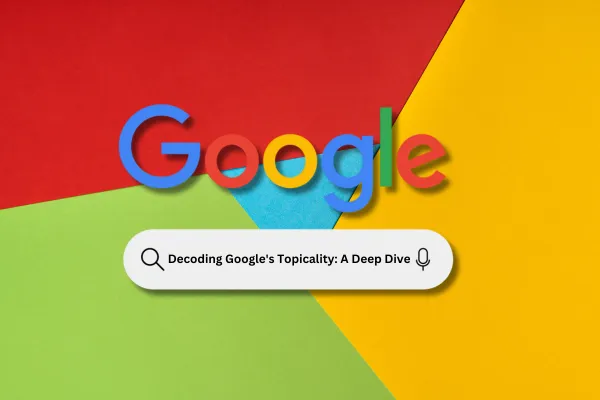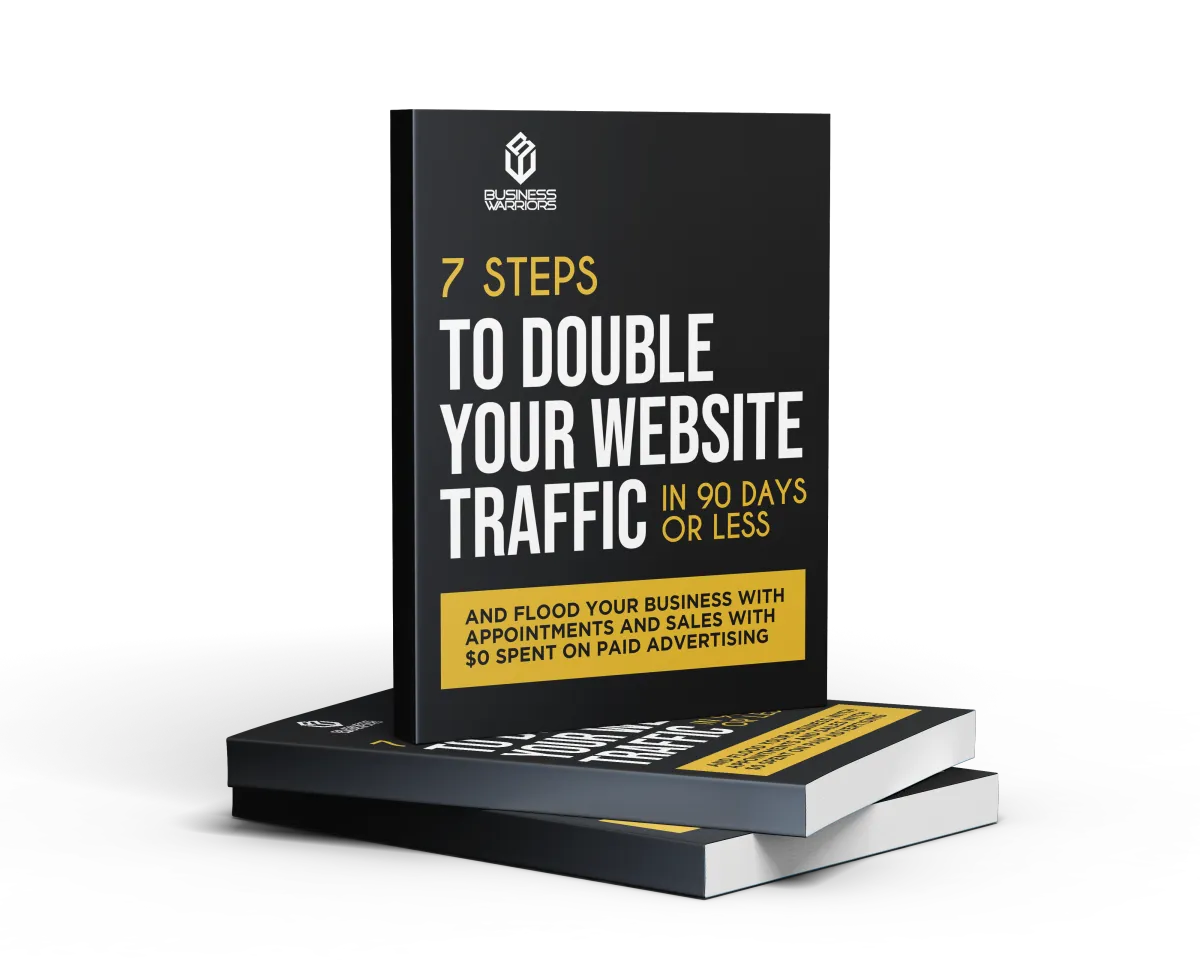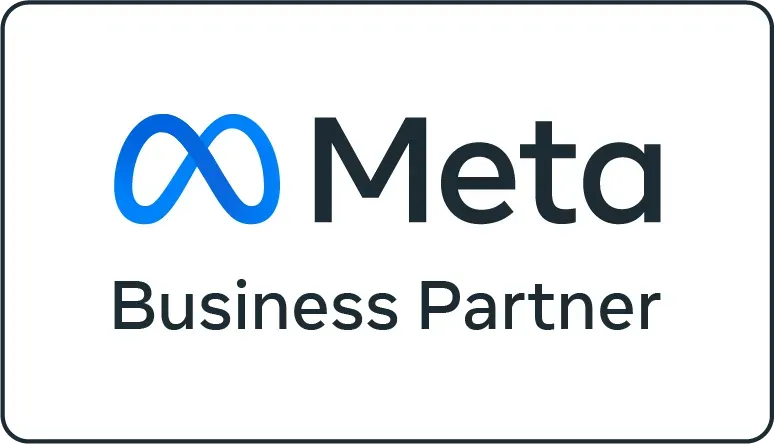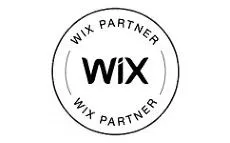Blog

Decoding Google's Topicality: A Deep Dive
Introduction: Understanding Google’s Topicality
In the ever-evolving world of SEO, Google's Topicality has become a crucial factor in determining how websites rank in search results. As Google’s algorithm grows smarter with artificial intelligence and machine learning, its ability to understand the context and relevance of content improves. This shift has moved SEO optimisation from mere keyword stuffing to a more sophisticated approach where Entity SEO, topical relevance, and authority play pivotal roles in determining rankings.
In this deep dive, we will unravel the concept of Google's Topicality, explore how it impacts search results, and provide practical strategies for optimising your website to align with Google's focus on topical relevance.
What is Google’s Topicality?
What Does Google's Topicality Mean?
Google’s Topicality refers to the search engine’s ability to assess how relevant a piece of content is to a specific topic or query. Instead of focusing solely on keywords, Google examines whether a webpage covers the topic comprehensively and naturally fits into the user’s search intent. This involves analysing the context, depth, and breadth of the content to determine if the site is a reliable source of information on the subject.
Think of topicality as a measure of how well your content addresses all aspects of a topic rather than just individual keywords. If your site contains well-researched, high-quality content that delves deep into a specific subject, Google is more likely to recognise it as authoritative and relevant, leading to higher rankings.
Google’s Understanding of Context and Relevance
Google’s algorithm doesn’t just look for keywords—it aims to understand the context behind those words. For example, if a user searches for "best running shoes," Google evaluates whether your content covers not just shoes but topics related to running, foot health, and the latest shoe technology.
This means that instead of just using keywords like “running shoes” repeatedly, content that discusses related concepts such as "foot cushioning," "sneaker durability," or "running shoe types" demonstrates a deeper understanding of the user’s needs. Topical relevance plays an integral role in the semantic search process, where Google connects related ideas to provide the most helpful result.
How Google's Topicality Helps Meet User Intent
User intent is the driving force behind Google's focus on topicality. When a user enters a search query, their goal isn’t just to find pages that mention a keyword—they want information that answers their question or solves their problem. By measuring topical relevance, Google ensures that the results presented are not only keyword-optimised but also meet the broader needs of the user.
For example, a person searching for "how to improve email marketing" is likely looking for more than just generic tips. They may need insights into strategies, tools, and best practices. A page that addresses each of these subtopics with clear and detailed content is more likely to be considered topically relevant and rank higher in search results.
Why is Topicality Important for SEO?
The Role of Topicality in Google’s Ranking Algorithm
Google's ranking algorithm evaluates content not only for individual keywords but also for how well it covers an entire subject area. This shift away from traditional keyword optimisation to a more holistic understanding of topics has made topicality one of the key factors in search engine rankings.
Why? Because content that is deeply relevant to a topic signals to Google that your website has authority on the subject, which can boost rankings. This makes Google’s Topicality critical to success in modern SEO.
How Topicality Impacts Your Website’s Visibility
Topical relevance directly affects how visible your content is in search results. If your content is topically rich—meaning it covers various aspects of a topic in detail—Google sees it as a comprehensive resource and is more likely to rank it highly. Here’s how:
Improved rankings for related keywords: Google will not only rank your content for your primary keyword but also for other relevant terms.
Better alignment with search intent: When content thoroughly addresses the various dimensions of a topic, it’s more likely to meet the needs of users.
How Does Google Measure Topicality?
Decoding How Google Analyses Topical Relevance
Google uses sophisticated technologies such as Natural Language Processing (NLP) and Machine Learning to determine topical relevance. These technologies allow Google to understand the relationships between words, phrases, and topics, and evaluate how well a piece of content fits within a given subject area.
Understanding Latent Semantic Indexing (LSI)
Latent Semantic Indexing (LSI) is one way that Google identifies the relationships between keywords and topics. By analysing the co-occurrence of words across millions of documents, Google can identify related terms and concepts. For example, in an article about digital marketing, terms like "SEO," "social media," and "content strategy" would naturally be related, enhancing the article’s topical relevance.
This means that content creators should focus not only on their main keyword but also on incorporating related phrases and ideas to help Google understand the broader context.
Topical Authority: What It Means to Be a Subject-Matter Expert
Building topical authority means establishing your website as a go-to resource on a particular subject. This is achieved by creating in-depth, well-structured content that comprehensively covers all aspects of a topic. Google rewards such authority with higher rankings, as it views the content as more valuable to users.
How to Improve Your Website’s Topical Relevance
Strategies for Optimising Your Website for Google’s Topicality
Here are key strategies to improve your site's topical relevance:
Create comprehensive topic clusters: Develop pillar pages that cover all major aspects of a subject, supported by more detailed, interlinked sub-pages.
Use related keywords: Go beyond primary keywords and include synonyms and related phrases that help build a broader context.
Regularly update content: Outdated content loses relevance. Keeping your content fresh shows Google that it remains relevant to your topic.
Using Related Keywords to Boost Topicality
Google’s Topicality relies on how well content fits within a broad subject. This means you should include related keywords that naturally occur in conversations about the topic. For example, an article about "email marketing" might include terms like "segmentation," "automation tools," and "conversion rates."
By expanding the scope of your content to address these related terms, you signal to Google that your content offers depth and covers a range of relevant topics.
Importance of Regular Content Updates
One of the most overlooked aspects of maintaining topical relevance is keeping content up to date. Google's algorithm prefers content that reflects current trends and information. Regularly reviewing and updating your posts can ensure they continue to rank well over time.
Topicality vs. Traditional Keyword Optimisation
Google’s Shift from Keywords to Topical Relevance
In the early days of SEO, websites could achieve rankings by stuffing pages with specific keywords. However, as Google’s algorithm has advanced, it now emphasises topical relevance over keyword frequency.
Why Topicality is More Effective Than Keyword Stuffing
Unlike keyword stuffing, which can result in penalties, focusing on topical relevance provides a more user-friendly and context-rich approach. Google now penalises websites that prioritise keywords at the expense of content quality, making topicality a better long-term strategy for SEO success.
The Future of Topicality in Google’s Algorithm
What’s Next for Google’s Topical Understanding?
As AI technologies like Google BERT and MUM become more sophisticated, Google’s ability to understand the nuances of language will improve, further refining its focus on topical relevance. This will make topical authority even more important in determining rankings.
Preparing Your SEO Strategy for Google’s Evolving Algorithms
To stay ahead, your SEO strategy must emphasise topical relevance. By focusing on creating high-quality, in-depth content that fully explores a subject, you can prepare for future algorithm updates and ensure your content remains visible.
Conclusion: Mastering Google’s Topicality for Better Rankings
Google's Topicality is transforming how content ranks in search results. By focusing on the depth and breadth of your content and ensuring it addresses all aspects of a topic, you can build topical authority and improve your site’s visibility in Google’s search results. Focus on creating content that genuinely serves user intent, and your rankings will reflect the effort.
Frequently Asked Questions About Google’s Topicality
What is topical relevance in SEO?
Topical relevance refers to how well content covers a specific subject and answers a user's query.
How does Google determine topical authority?
Google uses algorithms like NLP and LSI to evaluate content for comprehensive coverage and related topics.
How can I improve my website’s topical relevance?
Create in-depth content, use related keywords, and regularly update your posts.
What is the difference between topical SEO and keyword SEO?
Topical SEO focuses on overall subject coverage, while keyword SEO focuses on specific word optimisation.
WHAT WOULD YOUR RETURN ON INVESTMENT LOOK LIKE USING OUR DIGITAL MARKETING VORTEX METHOD TO YOUR BUSINESS?
GET THE DIGITAL MARKETING AGENCY SECRETS: 7 STEPS TO DOUBLE YOUR WEBSITE TRAFFIC IN 90 DAYS OR LESS








